Analysis of Refugee Support Organizations: ASRC & RISE - HSW1000
VerifiedAdded on 2022/10/16
|11
|2650
|304
Report
AI Summary
This report examines the Asylum Seeker Resource Centre (ASRC) and Refugees, Survivors, and Ex-detainees (RISE), two Australian organizations dedicated to supporting refugees. It begins with a description of each organization's purpose and functions, highlighting their roles in providing healthcare, education, legal aid, and advocacy. The analysis delves into the programs offered by both organizations, assessing their approaches to client health and wellbeing at micro-, mezzo-, and macro-levels, including mental health support, food security, and community integration initiatives. A comparative analysis is provided, identifying how the programs complement or contrast each other. The report also includes a SWOT analysis for each organization, identifying strengths, weaknesses, opportunities, and threats, such as funding challenges, government policies, and the increasing number of refugees. The report concludes by assessing how both organizations contribute to refugee support in Australia and the challenges they face.
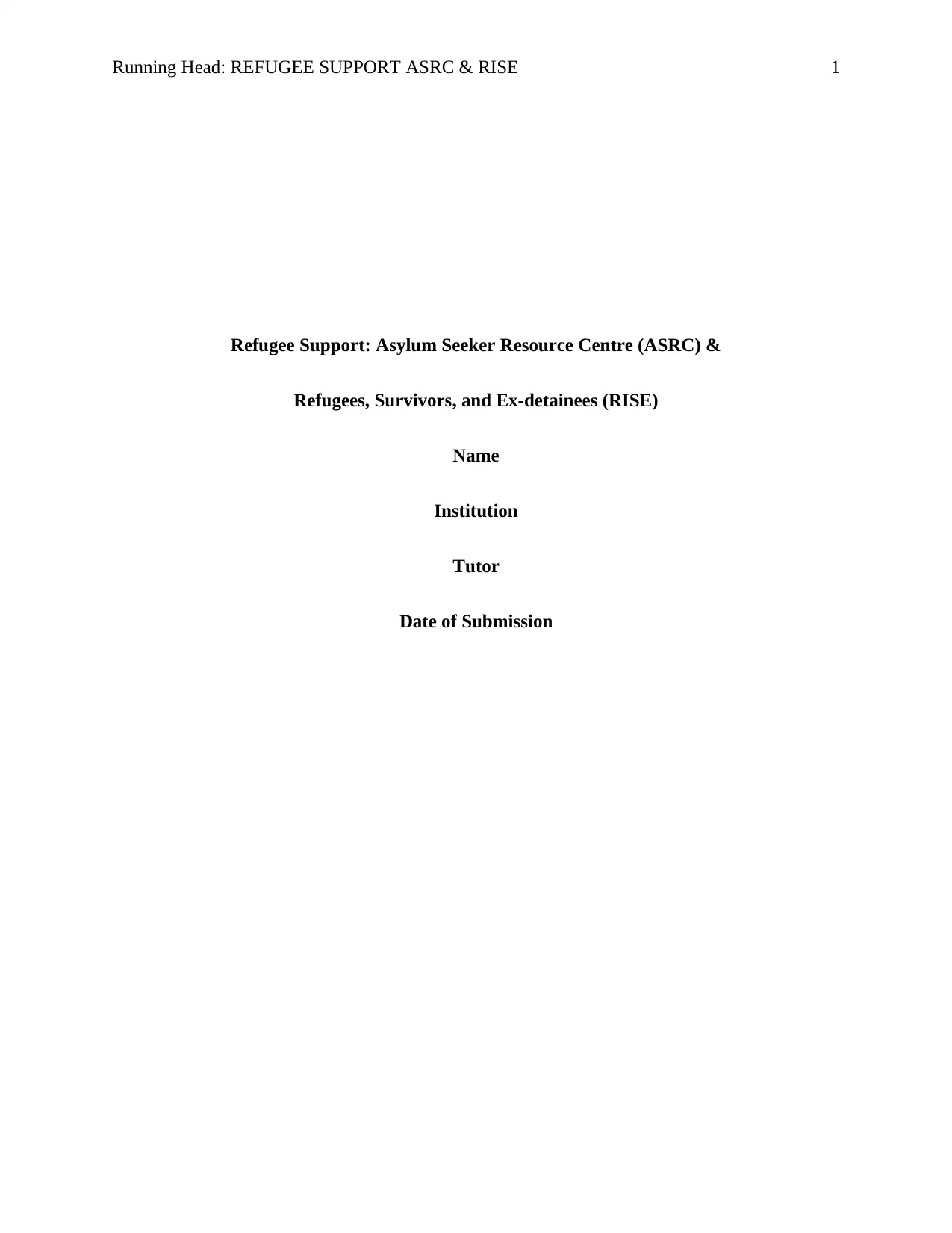
Running Head: REFUGEE SUPPORT ASRC & RISE 1
Refugee Support: Asylum Seeker Resource Centre (ASRC) &
Refugees, Survivors, and Ex-detainees (RISE)
Name
Institution
Tutor
Date of Submission
Refugee Support: Asylum Seeker Resource Centre (ASRC) &
Refugees, Survivors, and Ex-detainees (RISE)
Name
Institution
Tutor
Date of Submission
Paraphrase This Document
Need a fresh take? Get an instant paraphrase of this document with our AI Paraphraser
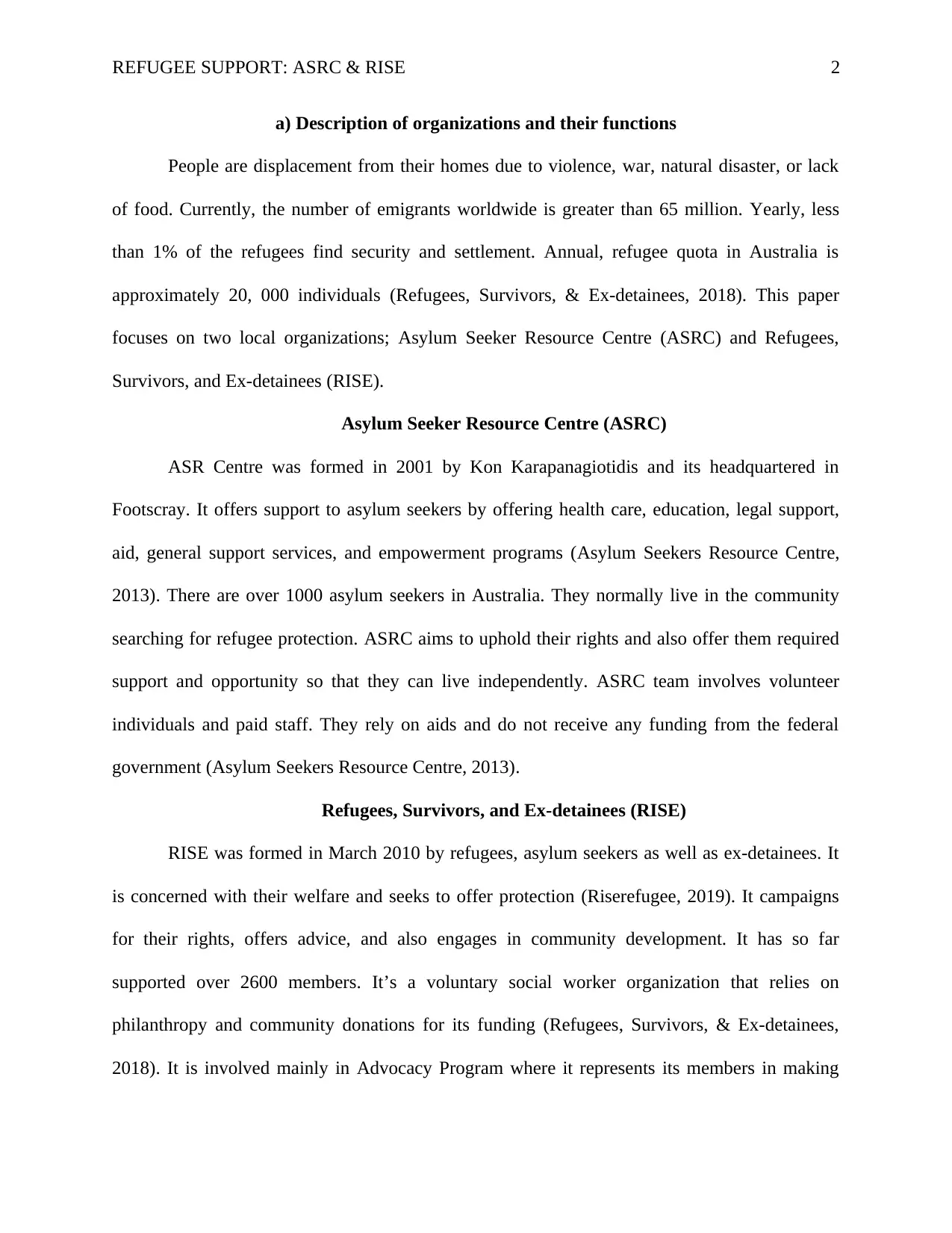
REFUGEE SUPPORT: ASRC & RISE 2
a) Description of organizations and their functions
People are displacement from their homes due to violence, war, natural disaster, or lack
of food. Currently, the number of emigrants worldwide is greater than 65 million. Yearly, less
than 1% of the refugees find security and settlement. Annual, refugee quota in Australia is
approximately 20, 000 individuals (Refugees, Survivors, & Ex-detainees, 2018). This paper
focuses on two local organizations; Asylum Seeker Resource Centre (ASRC) and Refugees,
Survivors, and Ex-detainees (RISE).
Asylum Seeker Resource Centre (ASRC)
ASR Centre was formed in 2001 by Kon Karapanagiotidis and its headquartered in
Footscray. It offers support to asylum seekers by offering health care, education, legal support,
aid, general support services, and empowerment programs (Asylum Seekers Resource Centre,
2013). There are over 1000 asylum seekers in Australia. They normally live in the community
searching for refugee protection. ASRC aims to uphold their rights and also offer them required
support and opportunity so that they can live independently. ASRC team involves volunteer
individuals and paid staff. They rely on aids and do not receive any funding from the federal
government (Asylum Seekers Resource Centre, 2013).
Refugees, Survivors, and Ex-detainees (RISE)
RISE was formed in March 2010 by refugees, asylum seekers as well as ex-detainees. It
is concerned with their welfare and seeks to offer protection (Riserefugee, 2019). It campaigns
for their rights, offers advice, and also engages in community development. It has so far
supported over 2600 members. It’s a voluntary social worker organization that relies on
philanthropy and community donations for its funding (Refugees, Survivors, & Ex-detainees,
2018). It is involved mainly in Advocacy Program where it represents its members in making
a) Description of organizations and their functions
People are displacement from their homes due to violence, war, natural disaster, or lack
of food. Currently, the number of emigrants worldwide is greater than 65 million. Yearly, less
than 1% of the refugees find security and settlement. Annual, refugee quota in Australia is
approximately 20, 000 individuals (Refugees, Survivors, & Ex-detainees, 2018). This paper
focuses on two local organizations; Asylum Seeker Resource Centre (ASRC) and Refugees,
Survivors, and Ex-detainees (RISE).
Asylum Seeker Resource Centre (ASRC)
ASR Centre was formed in 2001 by Kon Karapanagiotidis and its headquartered in
Footscray. It offers support to asylum seekers by offering health care, education, legal support,
aid, general support services, and empowerment programs (Asylum Seekers Resource Centre,
2013). There are over 1000 asylum seekers in Australia. They normally live in the community
searching for refugee protection. ASRC aims to uphold their rights and also offer them required
support and opportunity so that they can live independently. ASRC team involves volunteer
individuals and paid staff. They rely on aids and do not receive any funding from the federal
government (Asylum Seekers Resource Centre, 2013).
Refugees, Survivors, and Ex-detainees (RISE)
RISE was formed in March 2010 by refugees, asylum seekers as well as ex-detainees. It
is concerned with their welfare and seeks to offer protection (Riserefugee, 2019). It campaigns
for their rights, offers advice, and also engages in community development. It has so far
supported over 2600 members. It’s a voluntary social worker organization that relies on
philanthropy and community donations for its funding (Refugees, Survivors, & Ex-detainees,
2018). It is involved mainly in Advocacy Program where it represents its members in making
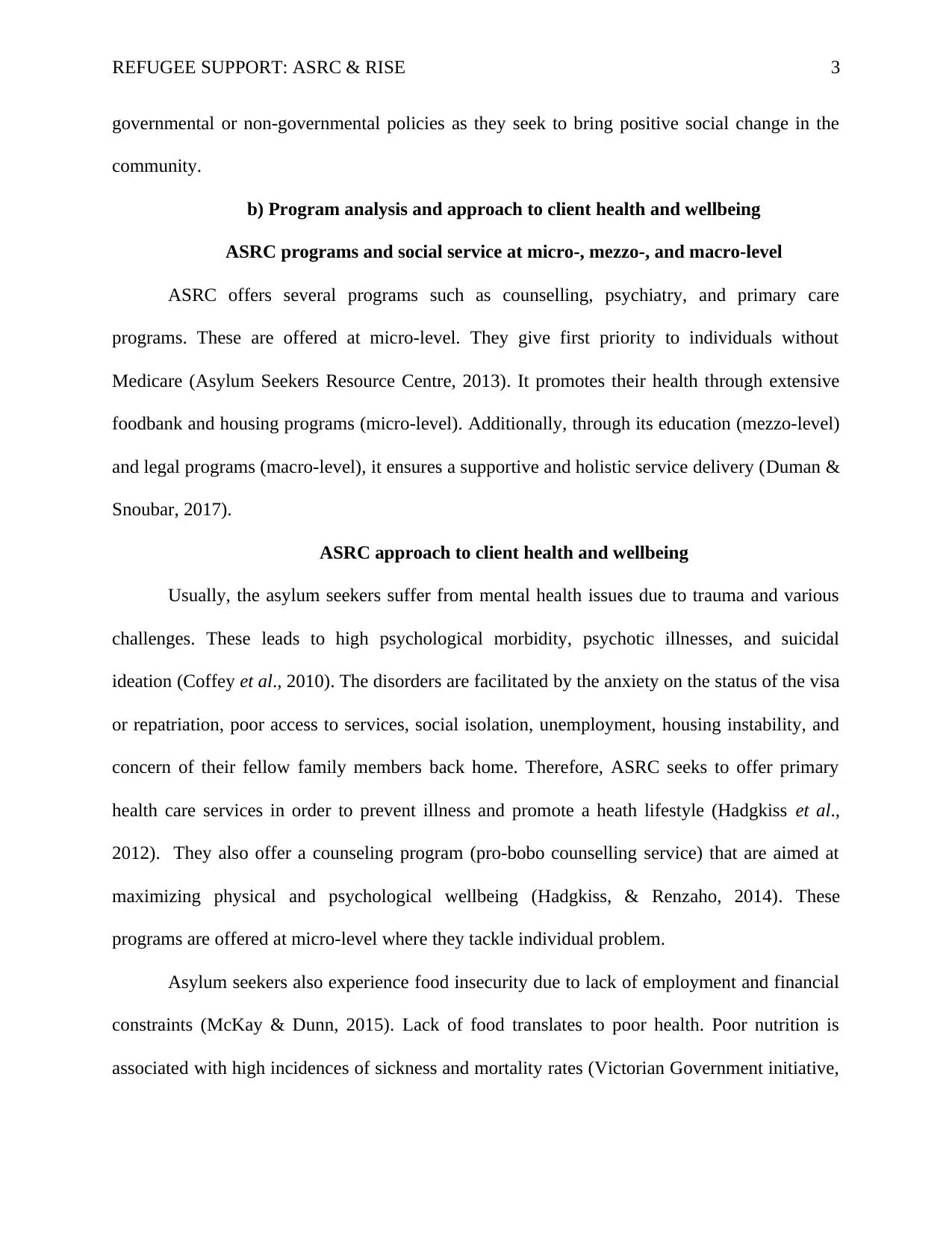
REFUGEE SUPPORT: ASRC & RISE 3
governmental or non-governmental policies as they seek to bring positive social change in the
community.
b) Program analysis and approach to client health and wellbeing
ASRC programs and social service at micro-, mezzo-, and macro-level
ASRC offers several programs such as counselling, psychiatry, and primary care
programs. These are offered at micro-level. They give first priority to individuals without
Medicare (Asylum Seekers Resource Centre, 2013). It promotes their health through extensive
foodbank and housing programs (micro-level). Additionally, through its education (mezzo-level)
and legal programs (macro-level), it ensures a supportive and holistic service delivery (Duman &
Snoubar, 2017).
ASRC approach to client health and wellbeing
Usually, the asylum seekers suffer from mental health issues due to trauma and various
challenges. These leads to high psychological morbidity, psychotic illnesses, and suicidal
ideation (Coffey et al., 2010). The disorders are facilitated by the anxiety on the status of the visa
or repatriation, poor access to services, social isolation, unemployment, housing instability, and
concern of their fellow family members back home. Therefore, ASRC seeks to offer primary
health care services in order to prevent illness and promote a heath lifestyle (Hadgkiss et al.,
2012). They also offer a counseling program (pro-bobo counselling service) that are aimed at
maximizing physical and psychological wellbeing (Hadgkiss, & Renzaho, 2014). These
programs are offered at micro-level where they tackle individual problem.
Asylum seekers also experience food insecurity due to lack of employment and financial
constraints (McKay & Dunn, 2015). Lack of food translates to poor health. Poor nutrition is
associated with high incidences of sickness and mortality rates (Victorian Government initiative,
governmental or non-governmental policies as they seek to bring positive social change in the
community.
b) Program analysis and approach to client health and wellbeing
ASRC programs and social service at micro-, mezzo-, and macro-level
ASRC offers several programs such as counselling, psychiatry, and primary care
programs. These are offered at micro-level. They give first priority to individuals without
Medicare (Asylum Seekers Resource Centre, 2013). It promotes their health through extensive
foodbank and housing programs (micro-level). Additionally, through its education (mezzo-level)
and legal programs (macro-level), it ensures a supportive and holistic service delivery (Duman &
Snoubar, 2017).
ASRC approach to client health and wellbeing
Usually, the asylum seekers suffer from mental health issues due to trauma and various
challenges. These leads to high psychological morbidity, psychotic illnesses, and suicidal
ideation (Coffey et al., 2010). The disorders are facilitated by the anxiety on the status of the visa
or repatriation, poor access to services, social isolation, unemployment, housing instability, and
concern of their fellow family members back home. Therefore, ASRC seeks to offer primary
health care services in order to prevent illness and promote a heath lifestyle (Hadgkiss et al.,
2012). They also offer a counseling program (pro-bobo counselling service) that are aimed at
maximizing physical and psychological wellbeing (Hadgkiss, & Renzaho, 2014). These
programs are offered at micro-level where they tackle individual problem.
Asylum seekers also experience food insecurity due to lack of employment and financial
constraints (McKay & Dunn, 2015). Lack of food translates to poor health. Poor nutrition is
associated with high incidences of sickness and mortality rates (Victorian Government initiative,
⊘ This is a preview!⊘
Do you want full access?
Subscribe today to unlock all pages.

Trusted by 1+ million students worldwide
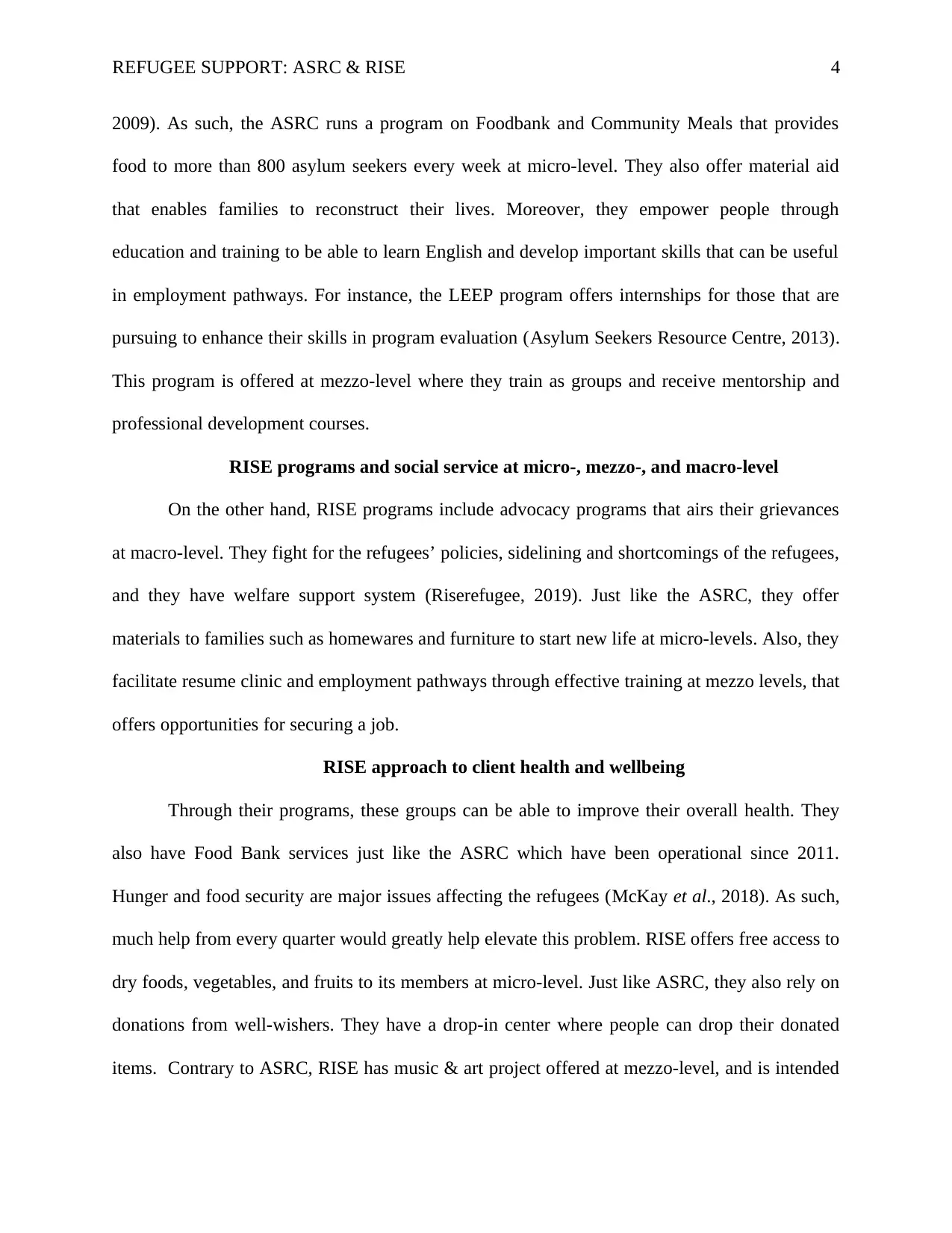
REFUGEE SUPPORT: ASRC & RISE 4
2009). As such, the ASRC runs a program on Foodbank and Community Meals that provides
food to more than 800 asylum seekers every week at micro-level. They also offer material aid
that enables families to reconstruct their lives. Moreover, they empower people through
education and training to be able to learn English and develop important skills that can be useful
in employment pathways. For instance, the LEEP program offers internships for those that are
pursuing to enhance their skills in program evaluation (Asylum Seekers Resource Centre, 2013).
This program is offered at mezzo-level where they train as groups and receive mentorship and
professional development courses.
RISE programs and social service at micro-, mezzo-, and macro-level
On the other hand, RISE programs include advocacy programs that airs their grievances
at macro-level. They fight for the refugees’ policies, sidelining and shortcomings of the refugees,
and they have welfare support system (Riserefugee, 2019). Just like the ASRC, they offer
materials to families such as homewares and furniture to start new life at micro-levels. Also, they
facilitate resume clinic and employment pathways through effective training at mezzo levels, that
offers opportunities for securing a job.
RISE approach to client health and wellbeing
Through their programs, these groups can be able to improve their overall health. They
also have Food Bank services just like the ASRC which have been operational since 2011.
Hunger and food security are major issues affecting the refugees (McKay et al., 2018). As such,
much help from every quarter would greatly help elevate this problem. RISE offers free access to
dry foods, vegetables, and fruits to its members at micro-level. Just like ASRC, they also rely on
donations from well-wishers. They have a drop-in center where people can drop their donated
items. Contrary to ASRC, RISE has music & art project offered at mezzo-level, and is intended
2009). As such, the ASRC runs a program on Foodbank and Community Meals that provides
food to more than 800 asylum seekers every week at micro-level. They also offer material aid
that enables families to reconstruct their lives. Moreover, they empower people through
education and training to be able to learn English and develop important skills that can be useful
in employment pathways. For instance, the LEEP program offers internships for those that are
pursuing to enhance their skills in program evaluation (Asylum Seekers Resource Centre, 2013).
This program is offered at mezzo-level where they train as groups and receive mentorship and
professional development courses.
RISE programs and social service at micro-, mezzo-, and macro-level
On the other hand, RISE programs include advocacy programs that airs their grievances
at macro-level. They fight for the refugees’ policies, sidelining and shortcomings of the refugees,
and they have welfare support system (Riserefugee, 2019). Just like the ASRC, they offer
materials to families such as homewares and furniture to start new life at micro-levels. Also, they
facilitate resume clinic and employment pathways through effective training at mezzo levels, that
offers opportunities for securing a job.
RISE approach to client health and wellbeing
Through their programs, these groups can be able to improve their overall health. They
also have Food Bank services just like the ASRC which have been operational since 2011.
Hunger and food security are major issues affecting the refugees (McKay et al., 2018). As such,
much help from every quarter would greatly help elevate this problem. RISE offers free access to
dry foods, vegetables, and fruits to its members at micro-level. Just like ASRC, they also rely on
donations from well-wishers. They have a drop-in center where people can drop their donated
items. Contrary to ASRC, RISE has music & art project offered at mezzo-level, and is intended
Paraphrase This Document
Need a fresh take? Get an instant paraphrase of this document with our AI Paraphraser
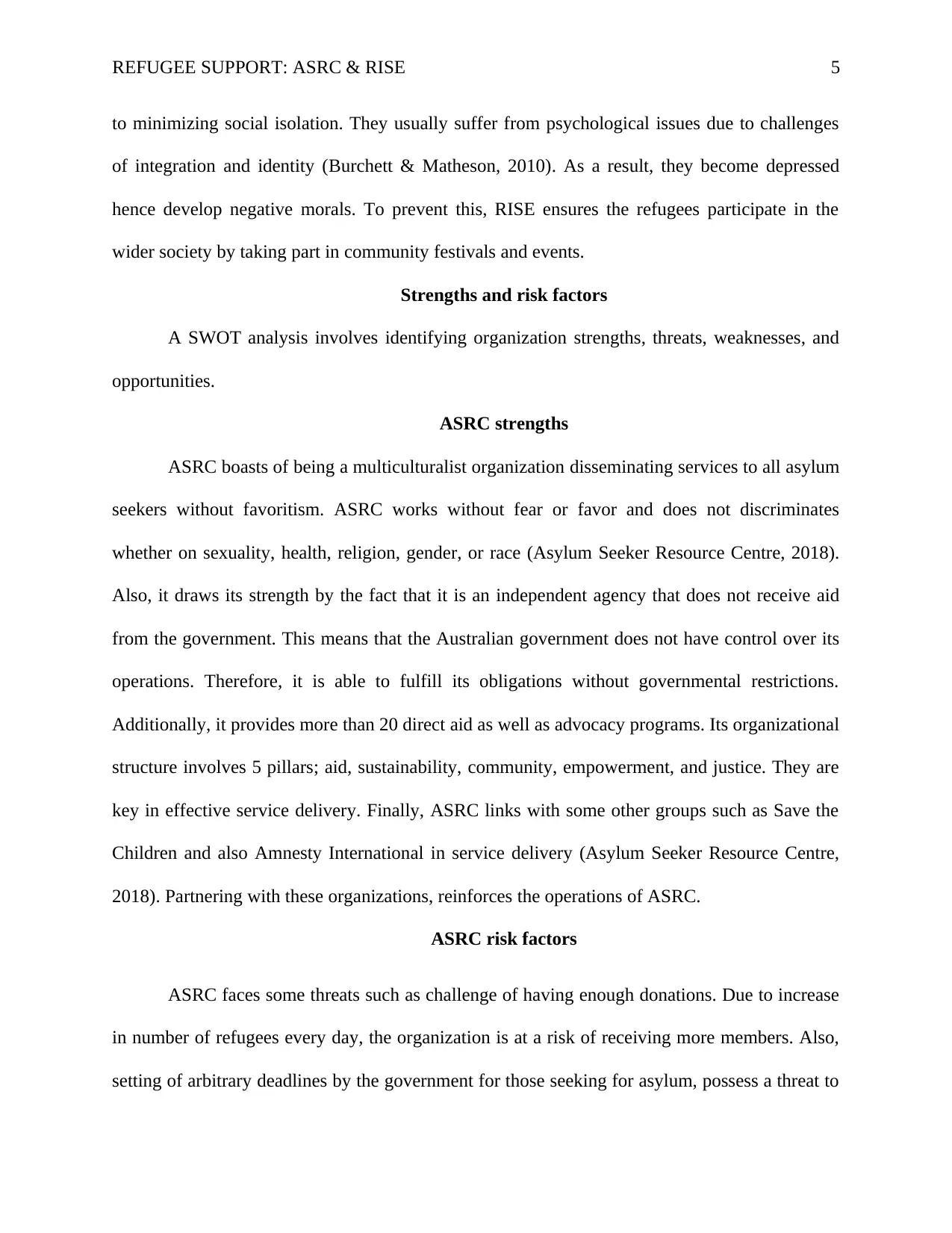
REFUGEE SUPPORT: ASRC & RISE 5
to minimizing social isolation. They usually suffer from psychological issues due to challenges
of integration and identity (Burchett & Matheson, 2010). As a result, they become depressed
hence develop negative morals. To prevent this, RISE ensures the refugees participate in the
wider society by taking part in community festivals and events.
Strengths and risk factors
A SWOT analysis involves identifying organization strengths, threats, weaknesses, and
opportunities.
ASRC strengths
ASRC boasts of being a multiculturalist organization disseminating services to all asylum
seekers without favoritism. ASRC works without fear or favor and does not discriminates
whether on sexuality, health, religion, gender, or race (Asylum Seeker Resource Centre, 2018).
Also, it draws its strength by the fact that it is an independent agency that does not receive aid
from the government. This means that the Australian government does not have control over its
operations. Therefore, it is able to fulfill its obligations without governmental restrictions.
Additionally, it provides more than 20 direct aid as well as advocacy programs. Its organizational
structure involves 5 pillars; aid, sustainability, community, empowerment, and justice. They are
key in effective service delivery. Finally, ASRC links with some other groups such as Save the
Children and also Amnesty International in service delivery (Asylum Seeker Resource Centre,
2018). Partnering with these organizations, reinforces the operations of ASRC.
ASRC risk factors
ASRC faces some threats such as challenge of having enough donations. Due to increase
in number of refugees every day, the organization is at a risk of receiving more members. Also,
setting of arbitrary deadlines by the government for those seeking for asylum, possess a threat to
to minimizing social isolation. They usually suffer from psychological issues due to challenges
of integration and identity (Burchett & Matheson, 2010). As a result, they become depressed
hence develop negative morals. To prevent this, RISE ensures the refugees participate in the
wider society by taking part in community festivals and events.
Strengths and risk factors
A SWOT analysis involves identifying organization strengths, threats, weaknesses, and
opportunities.
ASRC strengths
ASRC boasts of being a multiculturalist organization disseminating services to all asylum
seekers without favoritism. ASRC works without fear or favor and does not discriminates
whether on sexuality, health, religion, gender, or race (Asylum Seeker Resource Centre, 2018).
Also, it draws its strength by the fact that it is an independent agency that does not receive aid
from the government. This means that the Australian government does not have control over its
operations. Therefore, it is able to fulfill its obligations without governmental restrictions.
Additionally, it provides more than 20 direct aid as well as advocacy programs. Its organizational
structure involves 5 pillars; aid, sustainability, community, empowerment, and justice. They are
key in effective service delivery. Finally, ASRC links with some other groups such as Save the
Children and also Amnesty International in service delivery (Asylum Seeker Resource Centre,
2018). Partnering with these organizations, reinforces the operations of ASRC.
ASRC risk factors
ASRC faces some threats such as challenge of having enough donations. Due to increase
in number of refugees every day, the organization is at a risk of receiving more members. Also,
setting of arbitrary deadlines by the government for those seeking for asylum, possess a threat to
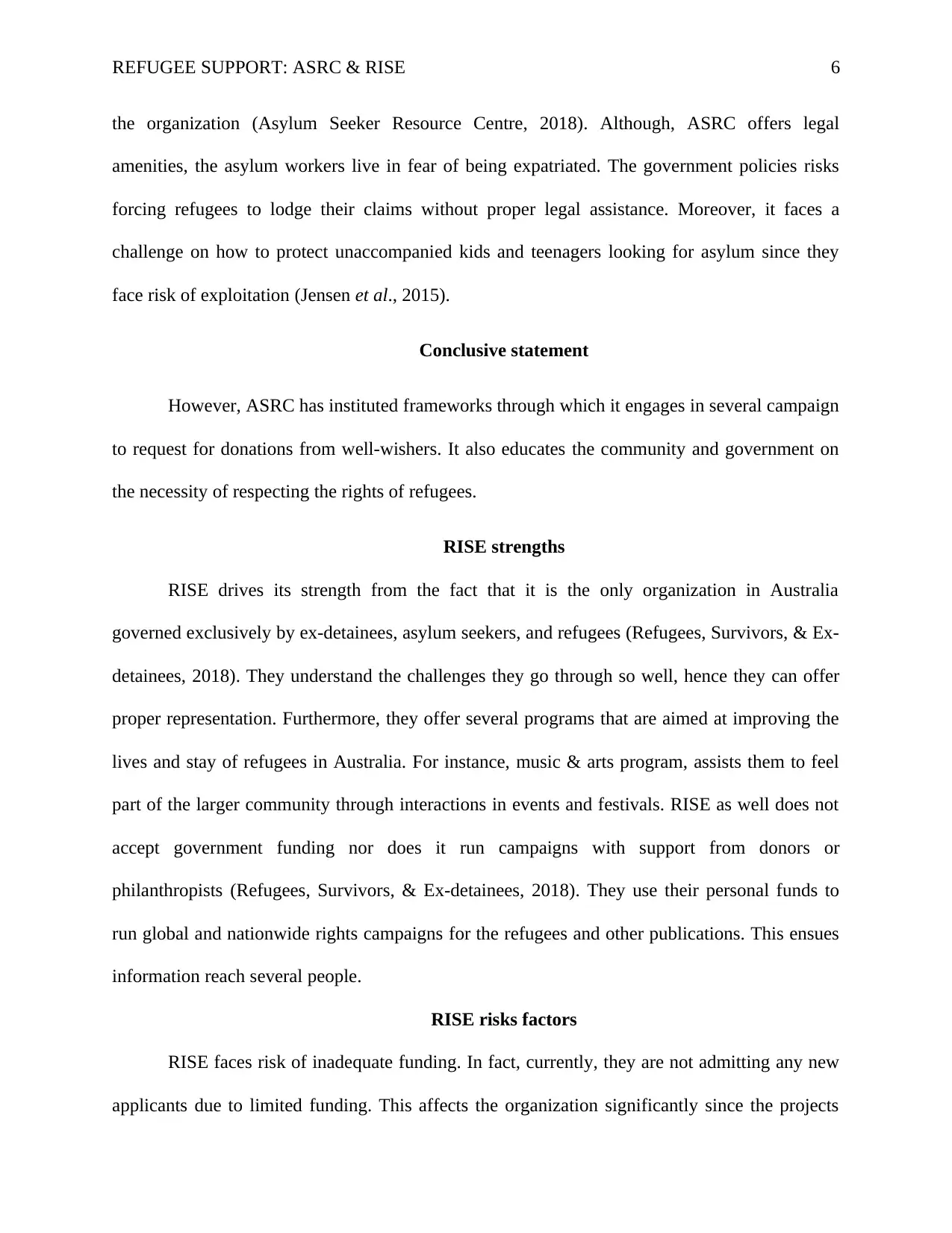
REFUGEE SUPPORT: ASRC & RISE 6
the organization (Asylum Seeker Resource Centre, 2018). Although, ASRC offers legal
amenities, the asylum workers live in fear of being expatriated. The government policies risks
forcing refugees to lodge their claims without proper legal assistance. Moreover, it faces a
challenge on how to protect unaccompanied kids and teenagers looking for asylum since they
face risk of exploitation (Jensen et al., 2015).
Conclusive statement
However, ASRC has instituted frameworks through which it engages in several campaign
to request for donations from well-wishers. It also educates the community and government on
the necessity of respecting the rights of refugees.
RISE strengths
RISE drives its strength from the fact that it is the only organization in Australia
governed exclusively by ex-detainees, asylum seekers, and refugees (Refugees, Survivors, & Ex-
detainees, 2018). They understand the challenges they go through so well, hence they can offer
proper representation. Furthermore, they offer several programs that are aimed at improving the
lives and stay of refugees in Australia. For instance, music & arts program, assists them to feel
part of the larger community through interactions in events and festivals. RISE as well does not
accept government funding nor does it run campaigns with support from donors or
philanthropists (Refugees, Survivors, & Ex-detainees, 2018). They use their personal funds to
run global and nationwide rights campaigns for the refugees and other publications. This ensues
information reach several people.
RISE risks factors
RISE faces risk of inadequate funding. In fact, currently, they are not admitting any new
applicants due to limited funding. This affects the organization significantly since the projects
the organization (Asylum Seeker Resource Centre, 2018). Although, ASRC offers legal
amenities, the asylum workers live in fear of being expatriated. The government policies risks
forcing refugees to lodge their claims without proper legal assistance. Moreover, it faces a
challenge on how to protect unaccompanied kids and teenagers looking for asylum since they
face risk of exploitation (Jensen et al., 2015).
Conclusive statement
However, ASRC has instituted frameworks through which it engages in several campaign
to request for donations from well-wishers. It also educates the community and government on
the necessity of respecting the rights of refugees.
RISE strengths
RISE drives its strength from the fact that it is the only organization in Australia
governed exclusively by ex-detainees, asylum seekers, and refugees (Refugees, Survivors, & Ex-
detainees, 2018). They understand the challenges they go through so well, hence they can offer
proper representation. Furthermore, they offer several programs that are aimed at improving the
lives and stay of refugees in Australia. For instance, music & arts program, assists them to feel
part of the larger community through interactions in events and festivals. RISE as well does not
accept government funding nor does it run campaigns with support from donors or
philanthropists (Refugees, Survivors, & Ex-detainees, 2018). They use their personal funds to
run global and nationwide rights campaigns for the refugees and other publications. This ensues
information reach several people.
RISE risks factors
RISE faces risk of inadequate funding. In fact, currently, they are not admitting any new
applicants due to limited funding. This affects the organization significantly since the projects
⊘ This is a preview!⊘
Do you want full access?
Subscribe today to unlock all pages.

Trusted by 1+ million students worldwide
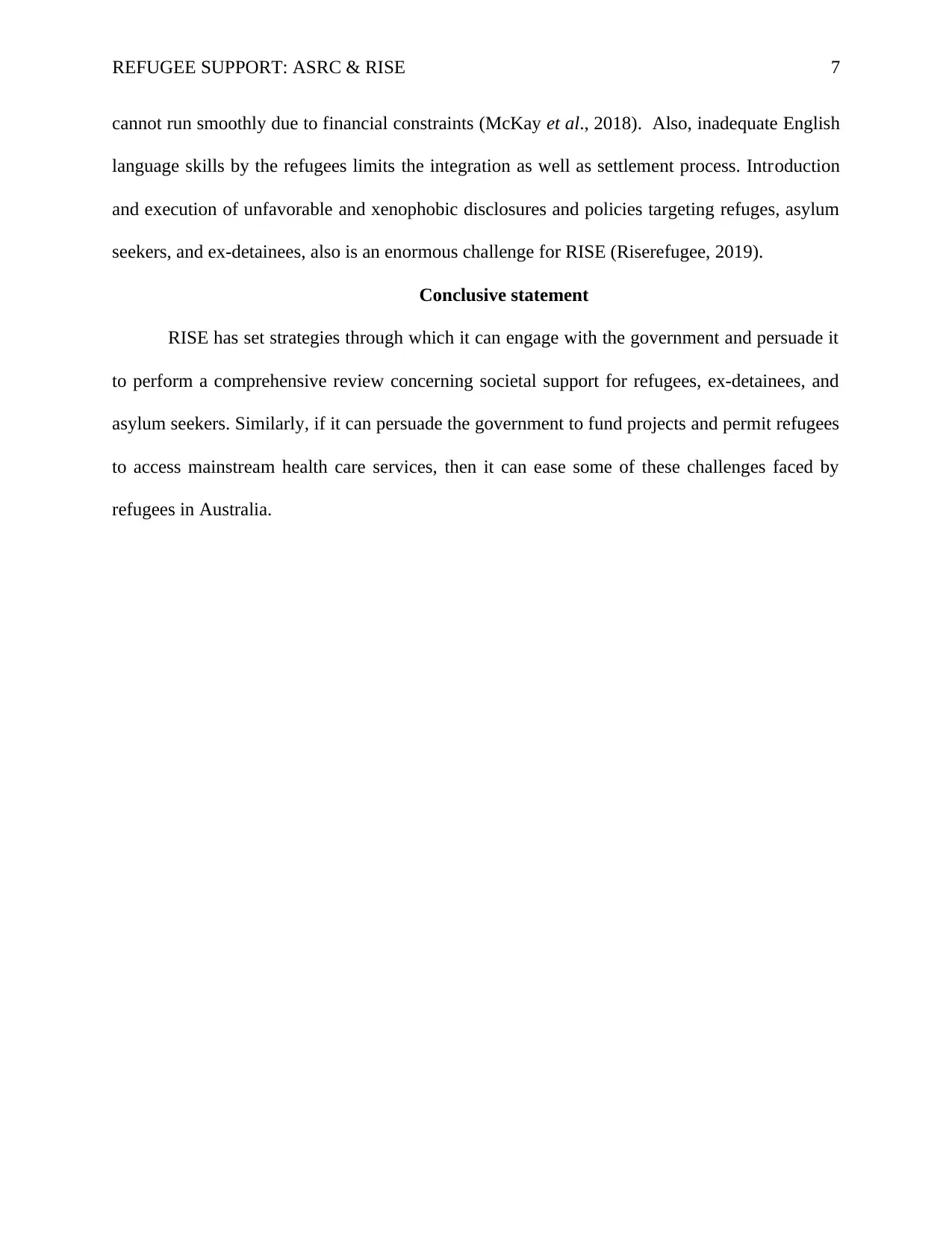
REFUGEE SUPPORT: ASRC & RISE 7
cannot run smoothly due to financial constraints (McKay et al., 2018). Also, inadequate English
language skills by the refugees limits the integration as well as settlement process. Introduction
and execution of unfavorable and xenophobic disclosures and policies targeting refuges, asylum
seekers, and ex-detainees, also is an enormous challenge for RISE (Riserefugee, 2019).
Conclusive statement
RISE has set strategies through which it can engage with the government and persuade it
to perform a comprehensive review concerning societal support for refugees, ex-detainees, and
asylum seekers. Similarly, if it can persuade the government to fund projects and permit refugees
to access mainstream health care services, then it can ease some of these challenges faced by
refugees in Australia.
cannot run smoothly due to financial constraints (McKay et al., 2018). Also, inadequate English
language skills by the refugees limits the integration as well as settlement process. Introduction
and execution of unfavorable and xenophobic disclosures and policies targeting refuges, asylum
seekers, and ex-detainees, also is an enormous challenge for RISE (Riserefugee, 2019).
Conclusive statement
RISE has set strategies through which it can engage with the government and persuade it
to perform a comprehensive review concerning societal support for refugees, ex-detainees, and
asylum seekers. Similarly, if it can persuade the government to fund projects and permit refugees
to access mainstream health care services, then it can ease some of these challenges faced by
refugees in Australia.
Paraphrase This Document
Need a fresh take? Get an instant paraphrase of this document with our AI Paraphraser
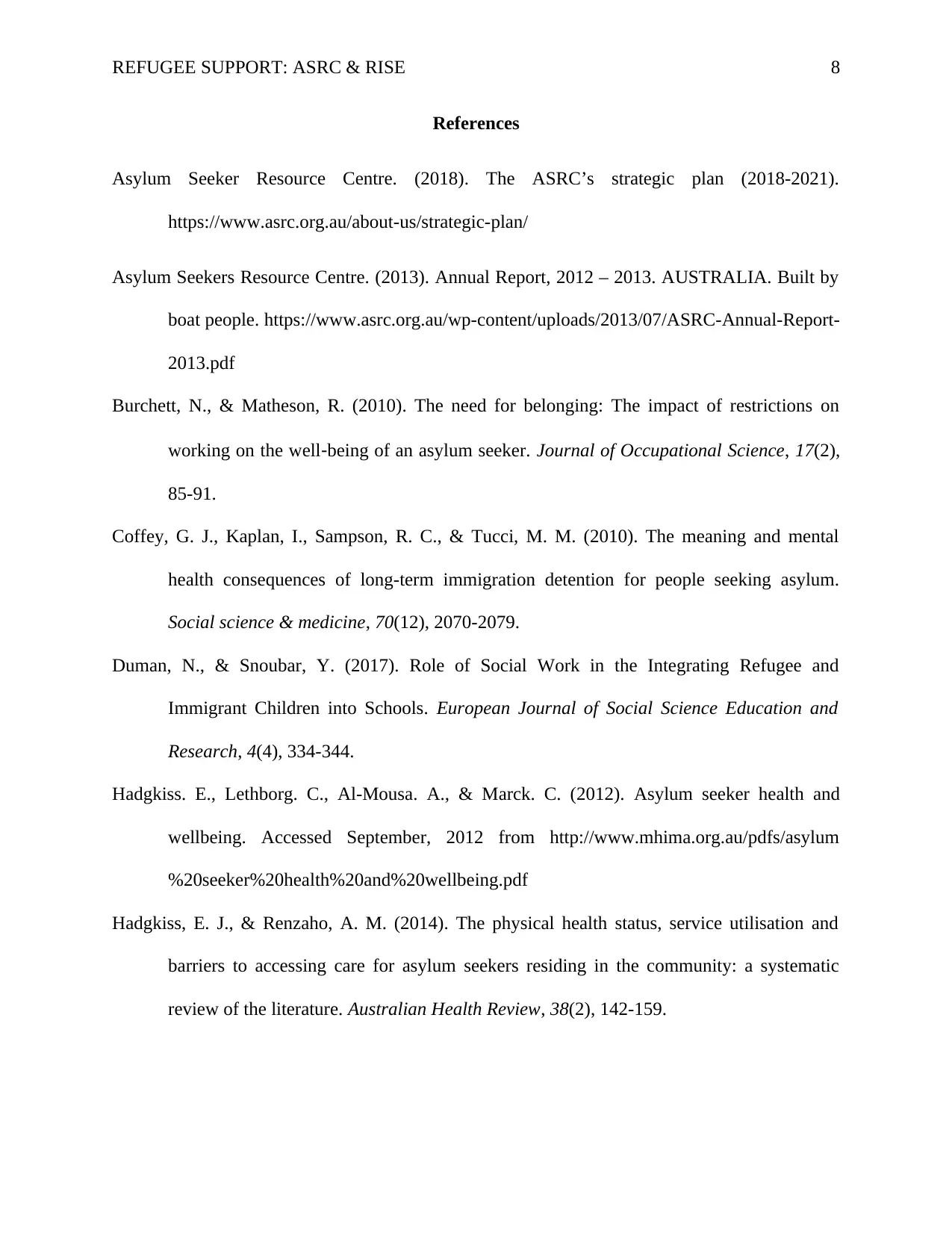
REFUGEE SUPPORT: ASRC & RISE 8
References
Asylum Seeker Resource Centre. (2018). The ASRC’s strategic plan (2018-2021).
https://www.asrc.org.au/about-us/strategic-plan/
Asylum Seekers Resource Centre. (2013). Annual Report, 2012 – 2013. AUSTRALIA. Built by
boat people. https://www.asrc.org.au/wp-content/uploads/2013/07/ASRC-Annual-Report-
2013.pdf
Burchett, N., & Matheson, R. (2010). The need for belonging: The impact of restrictions on
working on the well‐being of an asylum seeker. Journal of Occupational Science, 17(2),
85-91.
Coffey, G. J., Kaplan, I., Sampson, R. C., & Tucci, M. M. (2010). The meaning and mental
health consequences of long-term immigration detention for people seeking asylum.
Social science & medicine, 70(12), 2070-2079.
Duman, N., & Snoubar, Y. (2017). Role of Social Work in the Integrating Refugee and
Immigrant Children into Schools. European Journal of Social Science Education and
Research, 4(4), 334-344.
Hadgkiss. E., Lethborg. C., Al-Mousa. A., & Marck. C. (2012). Asylum seeker health and
wellbeing. Accessed September, 2012 from http://www.mhima.org.au/pdfs/asylum
%20seeker%20health%20and%20wellbeing.pdf
Hadgkiss, E. J., & Renzaho, A. M. (2014). The physical health status, service utilisation and
barriers to accessing care for asylum seekers residing in the community: a systematic
review of the literature. Australian Health Review, 38(2), 142-159.
References
Asylum Seeker Resource Centre. (2018). The ASRC’s strategic plan (2018-2021).
https://www.asrc.org.au/about-us/strategic-plan/
Asylum Seekers Resource Centre. (2013). Annual Report, 2012 – 2013. AUSTRALIA. Built by
boat people. https://www.asrc.org.au/wp-content/uploads/2013/07/ASRC-Annual-Report-
2013.pdf
Burchett, N., & Matheson, R. (2010). The need for belonging: The impact of restrictions on
working on the well‐being of an asylum seeker. Journal of Occupational Science, 17(2),
85-91.
Coffey, G. J., Kaplan, I., Sampson, R. C., & Tucci, M. M. (2010). The meaning and mental
health consequences of long-term immigration detention for people seeking asylum.
Social science & medicine, 70(12), 2070-2079.
Duman, N., & Snoubar, Y. (2017). Role of Social Work in the Integrating Refugee and
Immigrant Children into Schools. European Journal of Social Science Education and
Research, 4(4), 334-344.
Hadgkiss. E., Lethborg. C., Al-Mousa. A., & Marck. C. (2012). Asylum seeker health and
wellbeing. Accessed September, 2012 from http://www.mhima.org.au/pdfs/asylum
%20seeker%20health%20and%20wellbeing.pdf
Hadgkiss, E. J., & Renzaho, A. M. (2014). The physical health status, service utilisation and
barriers to accessing care for asylum seekers residing in the community: a systematic
review of the literature. Australian Health Review, 38(2), 142-159.
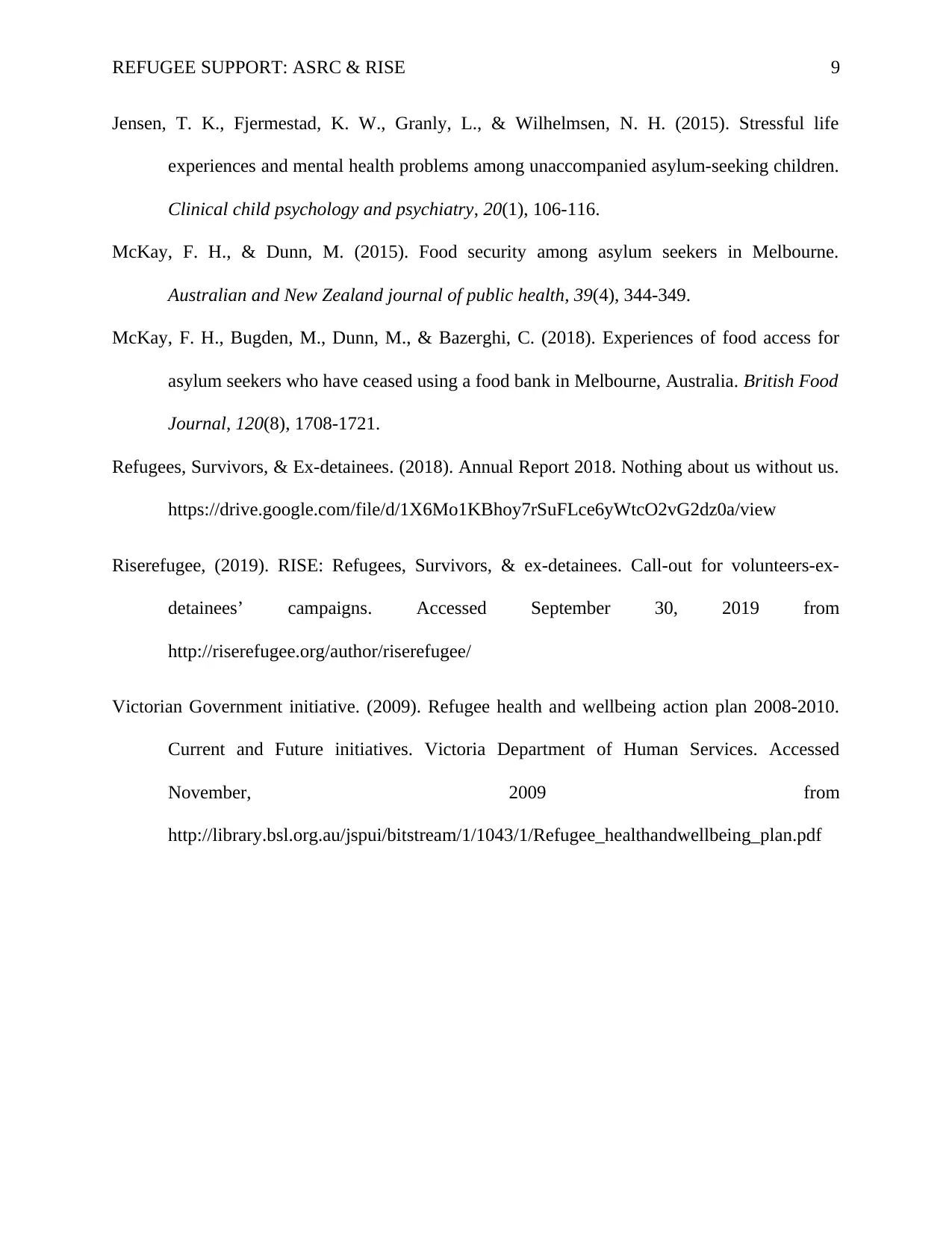
REFUGEE SUPPORT: ASRC & RISE 9
Jensen, T. K., Fjermestad, K. W., Granly, L., & Wilhelmsen, N. H. (2015). Stressful life
experiences and mental health problems among unaccompanied asylum-seeking children.
Clinical child psychology and psychiatry, 20(1), 106-116.
McKay, F. H., & Dunn, M. (2015). Food security among asylum seekers in Melbourne.
Australian and New Zealand journal of public health, 39(4), 344-349.
McKay, F. H., Bugden, M., Dunn, M., & Bazerghi, C. (2018). Experiences of food access for
asylum seekers who have ceased using a food bank in Melbourne, Australia. British Food
Journal, 120(8), 1708-1721.
Refugees, Survivors, & Ex-detainees. (2018). Annual Report 2018. Nothing about us without us.
https://drive.google.com/file/d/1X6Mo1KBhoy7rSuFLce6yWtcO2vG2dz0a/view
Riserefugee, (2019). RISE: Refugees, Survivors, & ex-detainees. Call-out for volunteers-ex-
detainees’ campaigns. Accessed September 30, 2019 from
http://riserefugee.org/author/riserefugee/
Victorian Government initiative. (2009). Refugee health and wellbeing action plan 2008-2010.
Current and Future initiatives. Victoria Department of Human Services. Accessed
November, 2009 from
http://library.bsl.org.au/jspui/bitstream/1/1043/1/Refugee_healthandwellbeing_plan.pdf
Jensen, T. K., Fjermestad, K. W., Granly, L., & Wilhelmsen, N. H. (2015). Stressful life
experiences and mental health problems among unaccompanied asylum-seeking children.
Clinical child psychology and psychiatry, 20(1), 106-116.
McKay, F. H., & Dunn, M. (2015). Food security among asylum seekers in Melbourne.
Australian and New Zealand journal of public health, 39(4), 344-349.
McKay, F. H., Bugden, M., Dunn, M., & Bazerghi, C. (2018). Experiences of food access for
asylum seekers who have ceased using a food bank in Melbourne, Australia. British Food
Journal, 120(8), 1708-1721.
Refugees, Survivors, & Ex-detainees. (2018). Annual Report 2018. Nothing about us without us.
https://drive.google.com/file/d/1X6Mo1KBhoy7rSuFLce6yWtcO2vG2dz0a/view
Riserefugee, (2019). RISE: Refugees, Survivors, & ex-detainees. Call-out for volunteers-ex-
detainees’ campaigns. Accessed September 30, 2019 from
http://riserefugee.org/author/riserefugee/
Victorian Government initiative. (2009). Refugee health and wellbeing action plan 2008-2010.
Current and Future initiatives. Victoria Department of Human Services. Accessed
November, 2009 from
http://library.bsl.org.au/jspui/bitstream/1/1043/1/Refugee_healthandwellbeing_plan.pdf
⊘ This is a preview!⊘
Do you want full access?
Subscribe today to unlock all pages.

Trusted by 1+ million students worldwide
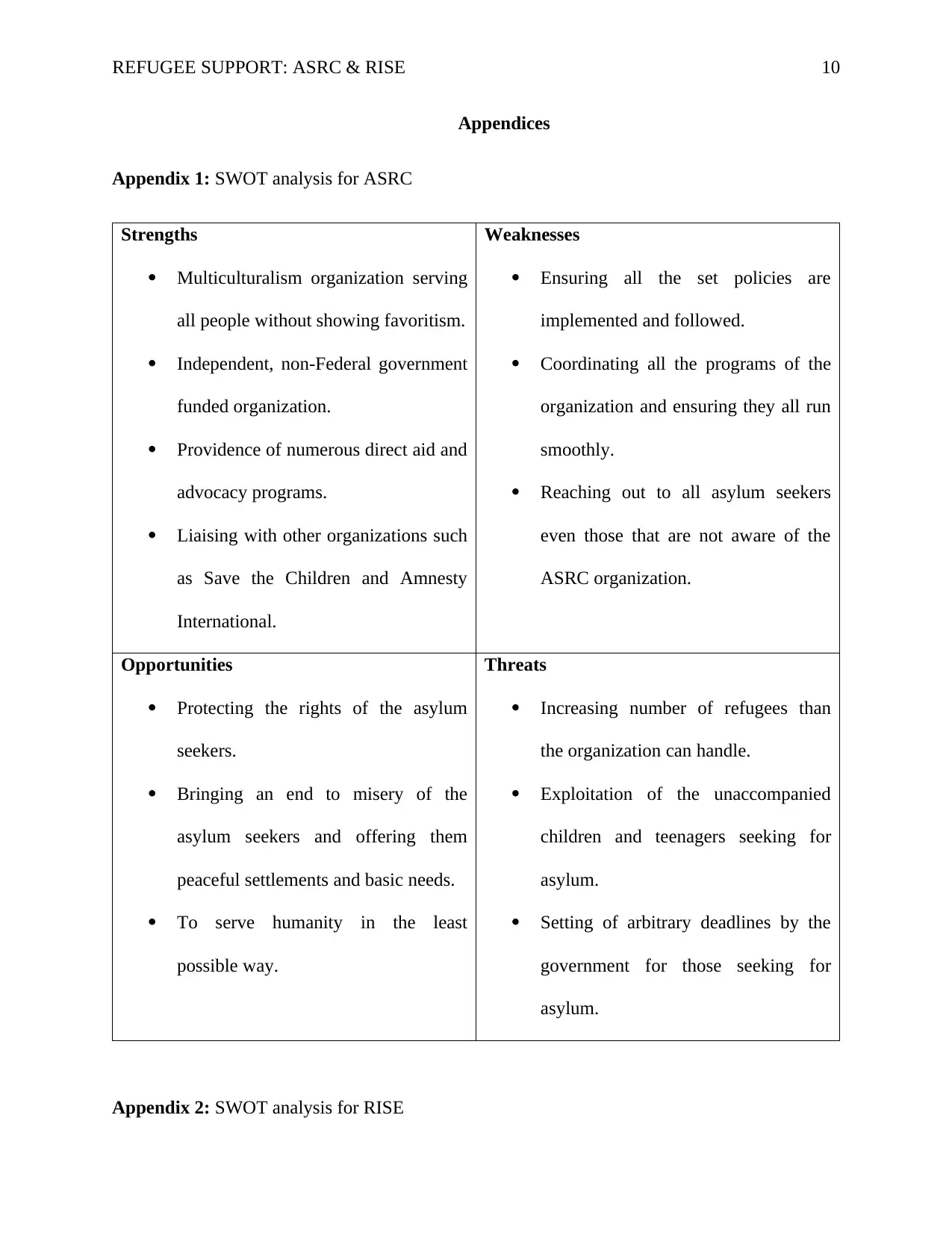
REFUGEE SUPPORT: ASRC & RISE 10
Appendices
Appendix 1: SWOT analysis for ASRC
Strengths
Multiculturalism organization serving
all people without showing favoritism.
Independent, non-Federal government
funded organization.
Providence of numerous direct aid and
advocacy programs.
Liaising with other organizations such
as Save the Children and Amnesty
International.
Weaknesses
Ensuring all the set policies are
implemented and followed.
Coordinating all the programs of the
organization and ensuring they all run
smoothly.
Reaching out to all asylum seekers
even those that are not aware of the
ASRC organization.
Opportunities
Protecting the rights of the asylum
seekers.
Bringing an end to misery of the
asylum seekers and offering them
peaceful settlements and basic needs.
To serve humanity in the least
possible way.
Threats
Increasing number of refugees than
the organization can handle.
Exploitation of the unaccompanied
children and teenagers seeking for
asylum.
Setting of arbitrary deadlines by the
government for those seeking for
asylum.
Appendix 2: SWOT analysis for RISE
Appendices
Appendix 1: SWOT analysis for ASRC
Strengths
Multiculturalism organization serving
all people without showing favoritism.
Independent, non-Federal government
funded organization.
Providence of numerous direct aid and
advocacy programs.
Liaising with other organizations such
as Save the Children and Amnesty
International.
Weaknesses
Ensuring all the set policies are
implemented and followed.
Coordinating all the programs of the
organization and ensuring they all run
smoothly.
Reaching out to all asylum seekers
even those that are not aware of the
ASRC organization.
Opportunities
Protecting the rights of the asylum
seekers.
Bringing an end to misery of the
asylum seekers and offering them
peaceful settlements and basic needs.
To serve humanity in the least
possible way.
Threats
Increasing number of refugees than
the organization can handle.
Exploitation of the unaccompanied
children and teenagers seeking for
asylum.
Setting of arbitrary deadlines by the
government for those seeking for
asylum.
Appendix 2: SWOT analysis for RISE
Paraphrase This Document
Need a fresh take? Get an instant paraphrase of this document with our AI Paraphraser
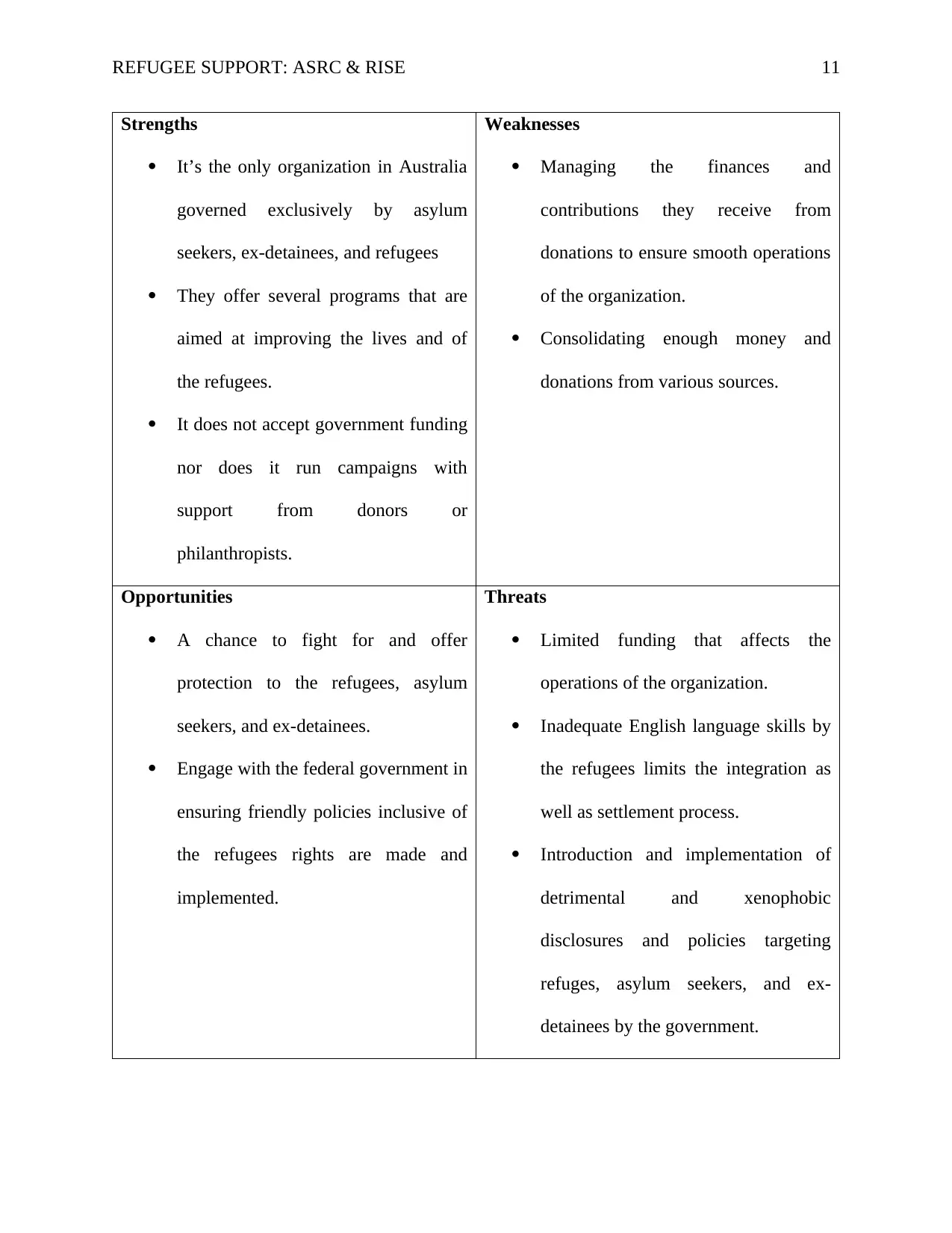
REFUGEE SUPPORT: ASRC & RISE 11
Strengths
It’s the only organization in Australia
governed exclusively by asylum
seekers, ex-detainees, and refugees
They offer several programs that are
aimed at improving the lives and of
the refugees.
It does not accept government funding
nor does it run campaigns with
support from donors or
philanthropists.
Weaknesses
Managing the finances and
contributions they receive from
donations to ensure smooth operations
of the organization.
Consolidating enough money and
donations from various sources.
Opportunities
A chance to fight for and offer
protection to the refugees, asylum
seekers, and ex-detainees.
Engage with the federal government in
ensuring friendly policies inclusive of
the refugees rights are made and
implemented.
Threats
Limited funding that affects the
operations of the organization.
Inadequate English language skills by
the refugees limits the integration as
well as settlement process.
Introduction and implementation of
detrimental and xenophobic
disclosures and policies targeting
refuges, asylum seekers, and ex-
detainees by the government.
Strengths
It’s the only organization in Australia
governed exclusively by asylum
seekers, ex-detainees, and refugees
They offer several programs that are
aimed at improving the lives and of
the refugees.
It does not accept government funding
nor does it run campaigns with
support from donors or
philanthropists.
Weaknesses
Managing the finances and
contributions they receive from
donations to ensure smooth operations
of the organization.
Consolidating enough money and
donations from various sources.
Opportunities
A chance to fight for and offer
protection to the refugees, asylum
seekers, and ex-detainees.
Engage with the federal government in
ensuring friendly policies inclusive of
the refugees rights are made and
implemented.
Threats
Limited funding that affects the
operations of the organization.
Inadequate English language skills by
the refugees limits the integration as
well as settlement process.
Introduction and implementation of
detrimental and xenophobic
disclosures and policies targeting
refuges, asylum seekers, and ex-
detainees by the government.
1 out of 11
Related Documents
Your All-in-One AI-Powered Toolkit for Academic Success.
+13062052269
info@desklib.com
Available 24*7 on WhatsApp / Email
![[object Object]](/_next/static/media/star-bottom.7253800d.svg)
Unlock your academic potential
Copyright © 2020–2026 A2Z Services. All Rights Reserved. Developed and managed by ZUCOL.




